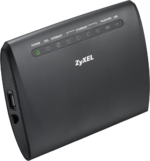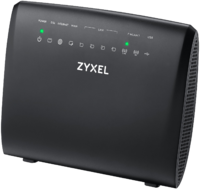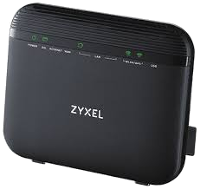VMG1312 Vs VMG3925: Difference between revisions
mNo edit summary |
mNo edit summary |
||
| (26 intermediate revisions by 4 users not shown) | |||
| Line 1: | Line 1: | ||
[[File:Vmg1312-b10d.png|250px|thumb|ZyXEL VMG1312-B10D]] |
|||
[[File:VMG3925-B10B-Large.png|300px|thumb|ZyXEL VMG3925-B10B]] |
|||
Thais page describes the differences between the ZyXEL VMG1312-B10D and the ZyXEL VMG3925-B10B routers. |
Thais page describes the differences between the ZyXEL VMG1312-B10D and the ZyXEL VMG3925-B10B routers. |
||
==The main differences are |
==The main differences are== |
||
*VMG3925 is more expensive |
*VMG3925 is more expensive |
||
*VMG3925 has 2.4 and 5G WiFi radio, the VMG1312 has only 2.4G |
*VMG3925 has 2.4 and 5G WiFi radio, the VMG1312 has only 2.4G |
||
| Line 11: | Line 8: | ||
*VMG3925 has a dedicated WAN Ethernet port, the VMG1312 has a shared LAN/WAN Ethernet port |
*VMG3925 has a dedicated WAN Ethernet port, the VMG1312 has a shared LAN/WAN Ethernet port |
||
*VMG3925 has a better wall mount |
*VMG3925 has a better wall mount |
||
In terms of hardware differences between the router: |
|||
The main difference, is the addition of an additional 5 GHz wireless |
|||
radio alongside the existing 2.4 GHz band one. This is of benefit to |
|||
customers in areas where the 2.4 GHz band is heavily congested. |
|||
5 GHz does NOT have a "longer reach" than 2.4 GHz, so it will not help in cases of signal attenuation. |
|||
It does however help in cases where the 2.4 GHz band has too many other devices on it. |
|||
It was believed that the VMG3925 has an extra common-mode noise filter on the telephone line, but this is not the case. |
|||
This router also has a dedicated WAN port, for FTTP. No configuration is |
|||
necessary to turn this on, or off. It is enabled by default. |
|||
The other difference is that instead of 100MBit/sec LAN ports on the |
|||
router, it has 1GBit/sec LAN ports. This may be beneficial for FTTP |
|||
customers as to not have the LAN ports becoming a bottleneck. |
|||
== Detailed differences == |
== Detailed differences == |
||
| Line 16: | Line 32: | ||
{| class="wikitable" |
{| class="wikitable" |
||
|- |
|- |
||
! !! VMG1312-B10D !! VMG3925-B10B |
! !! VMG1312-B10D !! VMG3925-B10B !! VMG3925-B10C |
||
|- |
|- |
||
| || [[File:Vmg1312-b10d.png|150px]] || [[File:VMG3925-B10B-Large.png|200px]] || [[File:VMG3925-B10C-200.png|200px]] |
|||
| ⚫ | |||
|- |
|- |
||
| |
| Notes || || || |
||
|- |
|- |
||
| ⚫ | |||
| ⚫ | |||
|- |
|- |
||
| Wall mountable || Suboptimal || Yes || Yes |
|||
| CPU || Broadcom BCM963381 || Broadcom ? |
|||
|- |
|- |
||
| ⚫ | |||
| ⚫ | |||
|- |
|- |
||
| CPU/SoC ||[https://www.broadcom.com/products/broadband/xdsl/bcm63381 Broadcom BCM63381] || [https://www.broadcom.com/products/broadband/xdsl/bcm63168 Broadcom BCM63168] |
|||
| ⚫ | |||
|- |
|||
| Architecture || BMIPS4350 || BMIPS4350 |
|||
|- |
|||
| ⚫ | |||
|- |
|||
| ⚫ | |||
|- |
|- |
||
| RAM || 64MB || 128MB |
| RAM || 64MB || 128MB |
||
| Line 34: | Line 56: | ||
| Flash || 128MB|| 128MB |
| Flash || 128MB|| 128MB |
||
|- |
|- |
||
| Switch chipset || On board the BCM63381 SoC ||[https://www.broadcom.com/products/ethernet-connectivity/switching/roboswitch/bcm53125/ BCM53125](Discrete) |
|||
| LAN Ethernet || 10/100M || 10/100/1000M |
|||
|- |
|- |
||
| |
| LAN Ethernet || 4 Ports 10/100M <br/>(To SoC)||4 Ports 10/100/1000M <br/> (To Switchchip) |
||
|- |
|- |
||
| WAN Ethernet || Virtual port from LAN 4 || Dedicated 10/100/1000M port<br/>(To Switchchip) || 10/100/1000M ports |
|||
| ⚫ | |||
|- |
|- |
||
| ⚫ | |||
| 2.4GHz Wireless || Yes || Yes |
|||
|- |
|- |
||
| 2. |
| 2.4 GHz Wireless || Yes || Yes || Yes |
||
|- |
|- |
||
| 2.4 GHz radio chains || 2 || 2 |
|||
| 2.4GHz chipset || BCM43227 (Discrete) || BCM6362 (On SoC) |
|||
|- |
|- |
||
| 2.4 GHz chipset || [https://www.broadcom.com/products/wireless/wireless-lan-infrastructure/bcm43224 BCM43227] (Discrete) || [https://www.broadcom.com/products/broadband/xdsl/bcm6362 BCM6362] (On BCM63168 SoC) |
|||
| 5GHz Wireless || No || Yes |
|||
|- |
|- |
||
| |
| 5 GHz Wireless || No || Yes || Yes |
||
|- |
|- |
||
| |
| 5 GHz radio chains || N/A || 3 || 3 |
||
|- |
|- |
||
| 5 GHz chipset || N/A ||[https://www.broadcom.com/products/wireless/wireless-lan-infrastructure/bcm4360 Broadcom BCM43602] (Discrete)<br/>[http://www.skyworksinc.com/Product/1791/SKY85712-21 SKY85712-21 ] RF Front-End |
|||
| ⚫ | |||
|- |
|- |
||
| ⚫ | |||
| ⚫ | |||
|- |
|||
| ⚫ | |||
|} |
|} |
||
You may note that the VMG3925-B10B has a slower CPU, however it also contains more dedicated hardware for packet processing compared to the VMG1312-B10D which needed the extra CPU clock cycles to deal with processing packets. |
|||
The VMG3925-B10B's SoC contains 1 Gigabit PHY, which connects to the Switch chip for the WAN and LAN ports. Radios are connected to the SoC, so packets passing through WAN/LAN<>WLAN would be limited to the bandwidth of the single Gigabit PHY inside assuming no other limiting factors i.e. WAN speed, WLAN radio bandwidth. |
|||
[[Category:AA Routers]] |
[[Category:AA Routers]] |
||
[[Category:ZyXEL VMG3925 B10B]] |
[[Category:ZyXEL VMG3925 B10B]] |
||
[[Category:ZyXEL VMG1312 B10D]] |
[[Category:ZyXEL VMG1312 B10D]] |
||
[[Category:ZyXEL VMG3925 B10C]] |
|||
Latest revision as of 12:06, 24 June 2020
Thais page describes the differences between the ZyXEL VMG1312-B10D and the ZyXEL VMG3925-B10B routers.
The main differences are
- VMG3925 is more expensive
- VMG3925 has 2.4 and 5G WiFi radio, the VMG1312 has only 2.4G
- VMG3925 has Gigabit Ethernet ports, the VMG1312 has 100M ports
- VMG3925 is physically larger, even though they are a similar shape
- VMG3925 has a dedicated WAN Ethernet port, the VMG1312 has a shared LAN/WAN Ethernet port
- VMG3925 has a better wall mount
In terms of hardware differences between the router:
The main difference, is the addition of an additional 5 GHz wireless radio alongside the existing 2.4 GHz band one. This is of benefit to customers in areas where the 2.4 GHz band is heavily congested.
5 GHz does NOT have a "longer reach" than 2.4 GHz, so it will not help in cases of signal attenuation. It does however help in cases where the 2.4 GHz band has too many other devices on it.
It was believed that the VMG3925 has an extra common-mode noise filter on the telephone line, but this is not the case.
This router also has a dedicated WAN port, for FTTP. No configuration is
necessary to turn this on, or off. It is enabled by default.
The other difference is that instead of 100MBit/sec LAN ports on the router, it has 1GBit/sec LAN ports. This may be beneficial for FTTP customers as to not have the LAN ports becoming a bottleneck.
Detailed differences
| VMG1312-B10D | VMG3925-B10B | VMG3925-B10C | |
|---|---|---|---|
 |
 |

| |
| Notes | |||
| Dimensions with stand (mm) | 160Wx115Hx60D | 185Wx147Hx85D | 180Wx145Hx29.8D |
| Wall mountable | Suboptimal | Yes | Yes |
| PSU Rating | 12V 1A | 12V 2A | 12V 2A |
| CPU/SoC | Broadcom BCM63381 | Broadcom BCM63168 | |
| Architecture | BMIPS4350 | BMIPS4350 | |
| CPU Cores | 2 | 2 | |
| CPU Frequency | 600 MHz | 400 MHz | |
| RAM | 64MB | 128MB | |
| Flash | 128MB | 128MB | |
| Switch chipset | On board the BCM63381 SoC | BCM53125(Discrete) | |
| LAN Ethernet | 4 Ports 10/100M (To SoC) |
4 Ports 10/100/1000M (To Switchchip) | |
| WAN Ethernet | Virtual port from LAN 4 | Dedicated 10/100/1000M port (To Switchchip) |
10/100/1000M ports |
| Wireless Protocols | 802.11 b/g/n | 802.11 a/b/g/n/ac | 802.11 a/b/g/n/ac |
| 2.4 GHz Wireless | Yes | Yes | Yes |
| 2.4 GHz radio chains | 2 | 2 | |
| 2.4 GHz chipset | BCM43227 (Discrete) | BCM6362 (On BCM63168 SoC) | |
| 5 GHz Wireless | No | Yes | Yes |
| 5 GHz radio chains | N/A | 3 | 3 |
| 5 GHz chipset | N/A | Broadcom BCM43602 (Discrete) SKY85712-21 RF Front-End | |
| xDSL Chipset | Broadcom BCM6303 ADSL/VDSL | Broadcom BCM6302 ADSL/VDSL | |
| USB | Yes, 2.0 | Yes, 2.0 | Yes, 2.0 |
You may note that the VMG3925-B10B has a slower CPU, however it also contains more dedicated hardware for packet processing compared to the VMG1312-B10D which needed the extra CPU clock cycles to deal with processing packets.
The VMG3925-B10B's SoC contains 1 Gigabit PHY, which connects to the Switch chip for the WAN and LAN ports. Radios are connected to the SoC, so packets passing through WAN/LAN<>WLAN would be limited to the bandwidth of the single Gigabit PHY inside assuming no other limiting factors i.e. WAN speed, WLAN radio bandwidth.